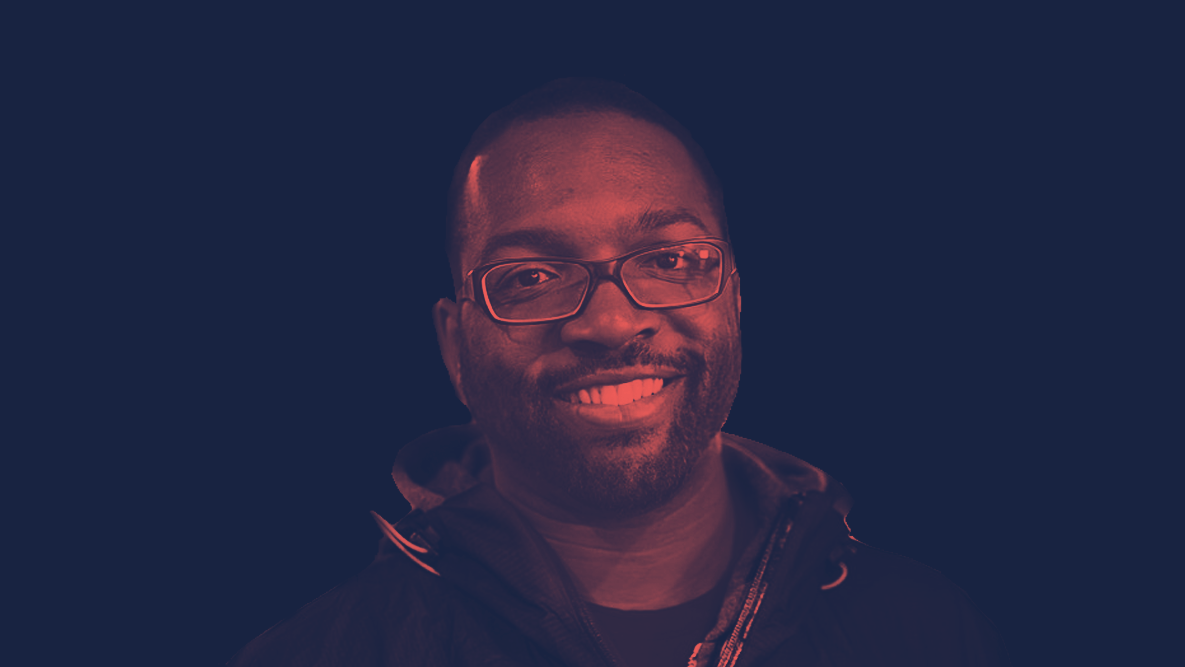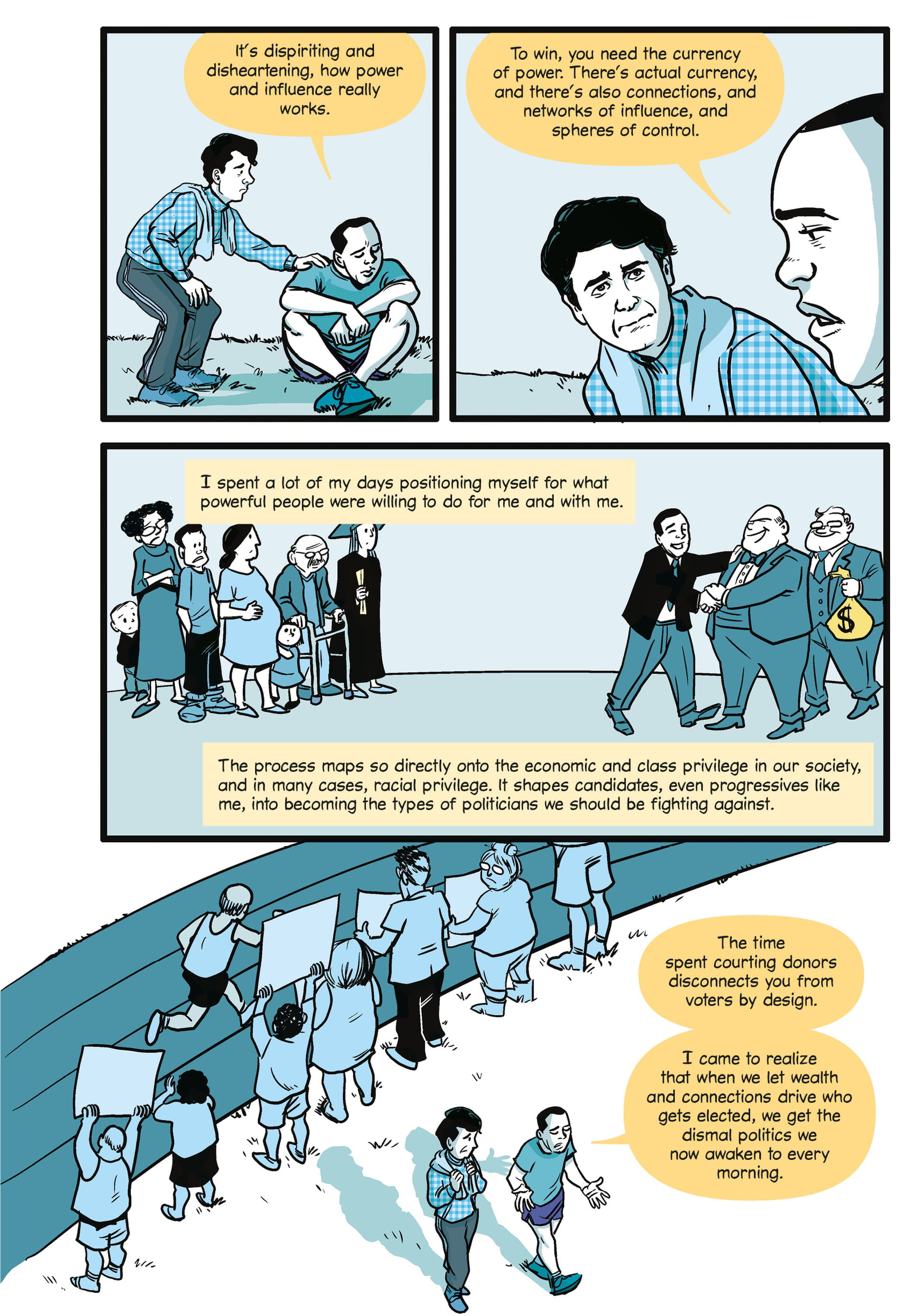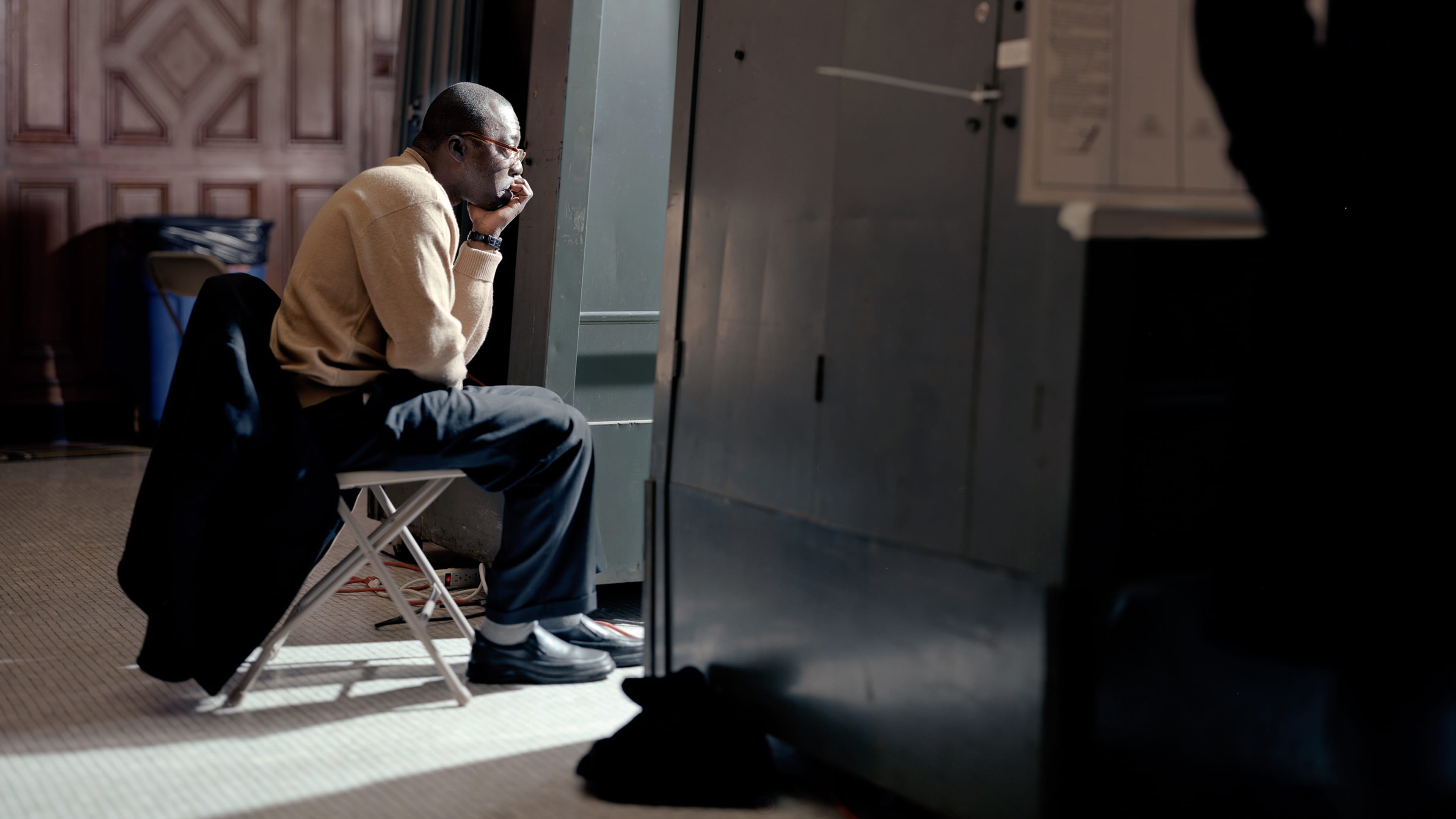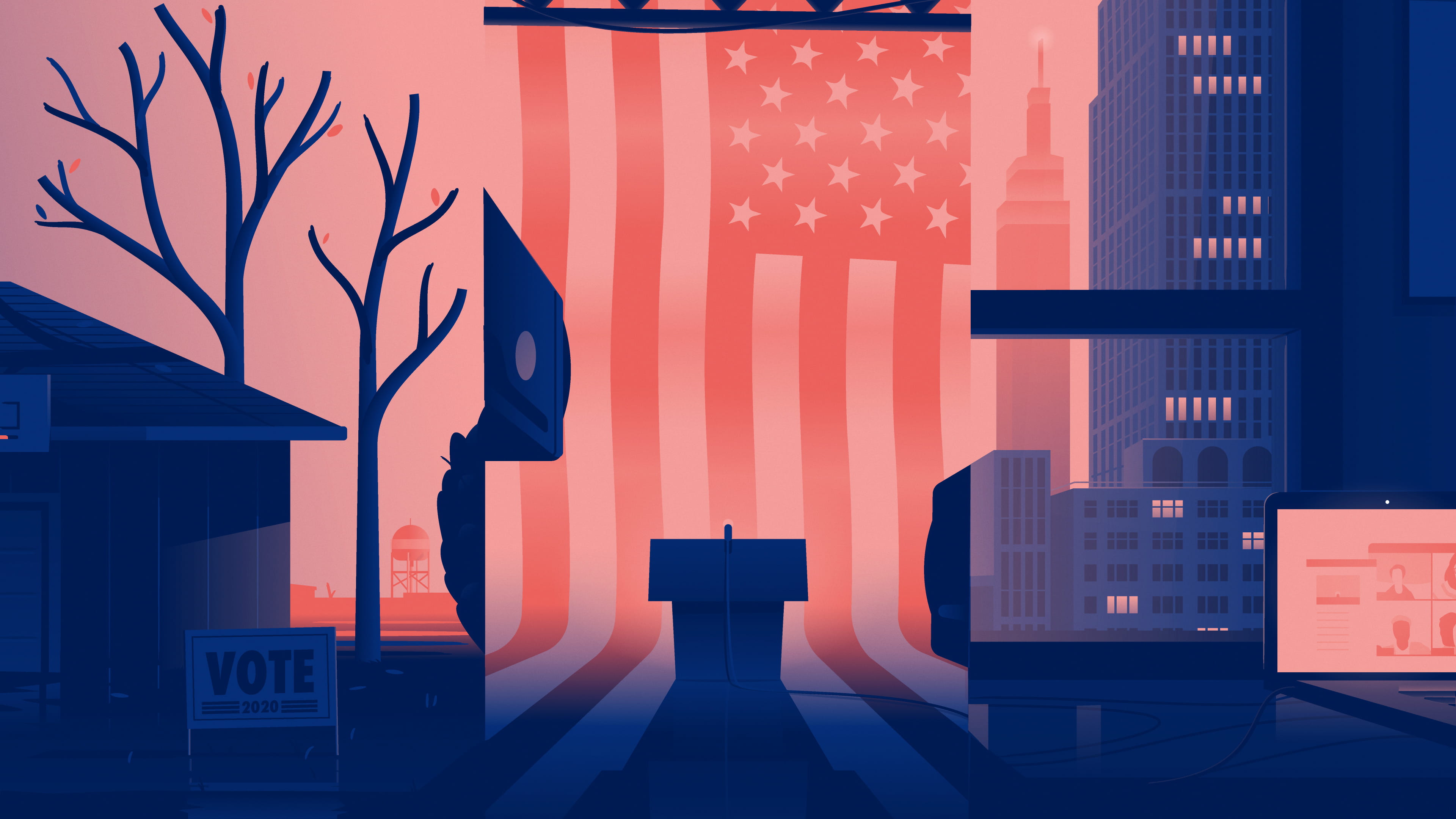In the lead-up to and the aftermath of the elections on 3 November, you’re going to be inundated with breaking news, the latest poll figures, and speculation about what’s going on in the US, and what it all means.
This guide is here to help you filter this information and put it calmly into context in a way that steers clear of sensationalism and hype.
Below, editors and correspondents from our international newsroom point you to the sources we ourselves are following for accurate and up-to-date information on the most relevant political developments. We also recommend articles, podcasts or books that will give you a deeper understanding of what is unfolding. And we share our own journalism where it offers original insight into the election.
If you’d like to receive regular updates on this guide, subscribe to our member newsletter here.

Putting the election in context
No event can be understood on its own, and this election is no different. Here you’ll find resources compiled by our editors and correspondents which give you a deeper understanding of the key issues at play in the 2020 presidential election, and which help you make sense of what’s happening beyond the headlines.
 How the US courts handling Trump’s (unsubstantiated) election claims have been shaped
In: Pushkin (4 November)
How the US courts handling Trump’s (unsubstantiated) election claims have been shaped
In: Pushkin (4 November)Now that over 99% of the election results are in, all eyes are on the courts. In the podcast series Deep Background, law professor Noah Feldman explains how the US Supreme Court has shifted to the right so much. He points to a single organisation: the Federalist Society. Six of nine Supreme Justices were, or are still, a member of this club.
Meanwhile, everywhere in the US judges are being appointed who were members of the Federalist Society as well. Having started out as a geeky student association four decades ago, the organisation has become a power to be reckoned with in judicial America. Waving goodbye to the Trump administration In: Slate (7 November)
I spent the Sunday night after the US elections reminding myself of what the best US satire news shows had to say about key members of the Trump administration early on in their one-term mandate. The awful nepotistic cast of characters could only be suffered, it seemed, through the sharp arrow of comedic mincing that outsider characters such as John Oliver or Trevor Noah could manage – the Ivanka Trumps, the Rudy Giulianis.
So, it is from that perspective that I joyously beheld a series of headlines from the journalists at Slate celebrating the end of this administration, "part of a series of goodbyes to Trumpworld figures". These straight-talking brief pieces are called "Goodbye Donald Trump Jr", "Goodbye Ben Carson", and "Goodbye Stephen Miller", in which writer Lowen Liu says: "Miller is in a rarified tier of villainy where armchair psychologising or ‘how did he get heres’ no longer apply. The damage he has done is all that matters."
The best satirists in the country broke character to tell us all along: these people are who they always have been, enabled by a powerful, still-respected system, and we can for now be rid of them.
 US democracy will not suddenly be fixed if Joe Biden wins the election
In: The New Yorker (5 November)
US democracy will not suddenly be fixed if Joe Biden wins the election
In: The New Yorker (5 November)Over the past four years, autocracy expert Masha Gessen has described how Trump has structurally steered the US political system towards an autocracy: by connecting the pillars of the rule of law through the appointment of loyalists in crucial positions, and through his close ties with Fox News anchors.
If Joe Biden is elected, Gessen writes, his biggest pitfall would be to think that Trump’s autocratic attempt has been averted, simply because he was voted out of the White House. The dismantling of autocratic structures – and the factors that made them possible – requires nothing less than the reinvention of US democracy, in spirit and purpose. This will be Biden’s greatest challenge, especially if the Senate remains in Republican hands.
 How will the US recover from this chaotic election?
In: NPR (3 November)
How will the US recover from this chaotic election?
In: NPR (3 November)There is a lot of work ahead to build back bridges in the US. In this short conversation, NPR’s David Greene talks to Eric Liu of Citizen University and the Aspen Institute, about how to affirm civic engagement across the divide.
There’s room for anger, there’s room for pain – but, Liu warns, to live like a citizen you must do more than vent: you must vent with intention, in a way that allows for better arguments that move things forward instead of freezing people out.
 The election results are not final yet. What will happen next? (In: The New Yorker, 4 November)
"The question now is not how far he will go to remain in office – the past four years have definitively answered that – but whether there is anyone left to stop him, as America enters the dangerous uncertainty of an election that does not yet have a winner."
The election results are not final yet. What will happen next? (In: The New Yorker, 4 November)
"The question now is not how far he will go to remain in office – the past four years have definitively answered that – but whether there is anyone left to stop him, as America enters the dangerous uncertainty of an election that does not yet have a winner."
 Financially and judicially, losing the election is not an option for Trump
In: The New Yorker (1 November)
Financially and judicially, losing the election is not an option for Trump
In: The New Yorker (1 November)If Donald Trump loses the presidential election, he will be confronted with high debts, dozens of lawsuits and perhaps even jail time. Trump has been bankrupt six times in his life and has survived some 4,000 lawsuits so far.
But his current situation seems extremely dire: he has personally guaranteed hundreds of millions of loans that will have to be refinanced in the coming years, while "no bank would touch him" anymore, according to a New York banker with a lot of experience in the real estate world. There are ongoing investigations into alleged tax, insurance and bank fraud committed by Trump, serious offences that could cost him his freedom.
It raises the question: should Trump be prosecuted if Joe Biden becomes president? Or would that raise the suspicion of a political reckoning? And if Trump wins a second term as president, will he be able to pardon himself?
 Trump is doing poorly in the polls. But the media are afraid to repeat their 2016 mistakes
In: Politico (21 October)
Trump is doing poorly in the polls. But the media are afraid to repeat their 2016 mistakes
In: Politico (21 October)The way Trump has been covered by journalists has been as much a part of his campaign and his presidency as Trump’s administration itself. The inability of the US news media to adjust to the suspension of norms under Trump means that he is always covered in ways that imbue him with more power than he has.
This article shows how, in the run up to the election, Trump is being covered in ways that depart significantly from how badly he is performing and polling. Part of that is due to Trump’s surprise win in 2016, and so analysts are once bitten, twice shy, afraid of looking blindsided again. So there is an unusual gap between how Trump’s electoral prospects are reported and the likelihood of him winning. Donald Trump has inadvertently exposed the limitations of US foreign policy (in: The Atlantic, 20 October) ‘After decades of international adventures that have left the US overstretched, overwhelmed, and overburdened, it was Trump who blurted out the uncomfortable truth: US foreign policy was failing, and had been for decades.’
 Mapping the militias who might get involved during election time
In: Armed Conflict Location & Event Data Project (21 October)
Mapping the militias who might get involved during election time
In: Armed Conflict Location & Event Data Project (21 October)Militia groups and other armed non-state actors pose a serious threat to the safety and security of US voters. Throughout the summer and leading up to the general election, these groups have become more assertive, with activities ranging from intervening in protests to organising kidnapping plots targeting elected officials.
In this joint report, the research projects ACLED and MilitiaWatch map the latest data on right-wing militia organisations across the country, identifying the most active groups and mapping the locations most likely to experience heightened militia activity before, during, and after the elections.
 In all scenarios after the election, the US may experience a period of great unrest
In: The Intercept (22 July)
In all scenarios after the election, the US may experience a period of great unrest
In: The Intercept (22 July)In this episode of investigative journalist Jeremy Scahill’s podcast, military expert and anthropologist David Kilcullen explores the three main post-election scenarios and their consequences: Biden wins, Trump wins, or the election results are contested. Kilcullen convincingly argues that all scenarios may result in further internal chaos in the US, with potentially huge consequences for global politics. This book helps you understand why the United States are more divided than ever Ezra Klein’s 2020 book Why We’re Polarized explains, as the name suggests, the many dynamics that lead to polarisation. It tells you how feedback loops between media, voters and politicians are the driving forces behind social division and have given rise to politicians like Donald Trump. The security of voting by mail, based on facts (in: The Guardian, 26 October) ‘An analysis of voter fraud cases maintained by the Heritage Foundation, a conservative think tank, found 143 cases of criminal convictions involving absentee ballots over the last 20 years. That amounts to 0.00006% of total votes cast.’
 Post-election violence is improbable, but let’s not take stability for granted
In: The Intercept (25 October)
Post-election violence is improbable, but let’s not take stability for granted
In: The Intercept (25 October)Sinclair Lewis’s 1935 novel It Can’t Happen Here sold a dazzling amount of copies in 2016 after Donald Trump defeated Hillary Clinton. As it turned out, it did happen: a populistic president who promised prosperity and national pride and who sympathised with right-wing militias.
Four years later, Trump’s first term might just turn into him being in power for eight years. And even if the Republican loses the election, some people fear polarisation in the US will reach its boiling point and civil war may break out. Journalist Elizabeth Rubin thinks about Yugoslavia, where many could not possibly imagine their country descending into violence just 30 years ago.
Granted, the US and Yugoslavia are completely different countries – socially, politically, ethnically, religion-wise. But there are similarities, too: states that dislike the central leadership, public provocation, armed groups patrolling the streets here and there. Hopeful and yet anxious, Rubin writes: "I don’t think we’re there yet. In fact, I can’t believe we’ll ever be there. But neither did they." A broad African perspective on the US elections In: Mail & Guardian (31 October)
"For many African countries, America’s democracy was the gold standard," writes anti-corruption campaigner John Githongo in his analysis for a special edition of The Continent magazine, dedicated to a pan-African view of the US elections. "Times have changed."
This issue, guest-edited by Nairobi-based writer Nanjala Nyabola, includes views by 27 writers, from 15 countries, in 10 different languages. It includes a piece in Portuguese drawing parallels between elections in Angola and in the US (in Angola it is the opposition that cries foul before the elections, writes blogger Cláudio Silva), and one by Uganda’s feminist writer Rosebell Kagumire on what having Kamala Harris as a vice president could mean for countries beyond the US.
Journalist Patrick Gathara sums it up in another piece that suggests the US is not a role model: "As it urged Africans to tame rogue presidents and executives, the US was incubating its own unaccountable overlord at home. As it insisted on free, fair and transparent elections abroad, its own elections were becoming increasingly unfree, unfair and opaque."
 Not just the president has to be replaced. The democratic system itself needs a revival
In: Financial Times (15 October)
Not just the president has to be replaced. The democratic system itself needs a revival
In: Financial Times (15 October)The US Constitution was written at the end of the 18th century. Until recently, constitutional actualisation was hardly ever discussed in judicial circles. US Americans are very proud of their Constitution, one of the oldest in the world.
But ever since Trump came into power, this is changing. A growing minority now thinks the Constitution needs to be updated. Politics has become dysfunctional: the debate is completely polarised, and large parts of the population don’t feel represented (enough) in politics. In addition, Congress can’t seem to properly fulfil its duty: keeping presidential power in check.
On top of that, the balance between conservative and liberal Justices on the Supreme Court has changed to 6-3 with the appointment of the conservative Justice Amy Coney Barrett. Constitutional rights such as abortion are no longer a certainty in the United States. This may result in a constitutional crisis, as US Americans might not willingly accept the withdrawal of these fundamental rights.
To prevent a crisis like that, the Constitution has to be revised. Which is close to impossible, as it would need three-quarters of US states and two-thirds of Congress to vote in favour. If the US remains polarised this way, journalist Edward Luce expects the country to turn into the "sick man of the west" when it comes to government.
 It’s not Facebook that’s driving the conspiracy theories on mail-in voting fraud. It’s Fox
In: Berkman Center Research (8 October)
It’s not Facebook that’s driving the conspiracy theories on mail-in voting fraud. It’s Fox
In: Berkman Center Research (8 October)Tens of millions of US Americans believe that mail fraud is a serious problem that might affect the elections. Yet, independent researchers and journalists show time after time that this is extremely unlikely. A team of Harvard researchers, led by Yochai Benkler, show convincingly how this idea took root.
By analysing 55,000 online media stories, five million tweets, and 75,000 posts on public Facebook pages, they make clear: it’s not Facebook, it’s Fox. The researchers write: "Contrary to the focus of most contemporary work on disinformation, our findings suggest that this highly effective disinformation campaign, with potentially profound effects for both participation in and the legitimacy of the 2020 election, was an elite-driven, mass-media led process. Social media played only a secondary and supportive role." Despite the Trump administration’s anti-Muslim actions, support for the president has increased among this demographic group (in: Religion News, 1 October) ‘Muslims still overwhelmingly prefer Democrats in the White House over Republicans. Asked during the primary season in March and April who they would vote for if the presidential election were being held that day, 51% of Muslim respondents said they would choose a generic Democratic candidate, compared with 16% who said they would support a Republican.’
 This video explains how unfair the US voting system really is
In: The New York Times (28 September)
This video explains how unfair the US voting system really is
In: The New York Times (28 September)On average, black and Latinx voters in the US have a much harder time to vote than white US Americans when it comes to elections, and that is because of the current voting laws. This video by The New York Times explains why in detail, looking at the history of black rights and voting laws, and how hard-won rights from the 1960s civil rights fight were partly lost thanks to a 2013 ruling by the US Supreme Court. As a result of this ruling, several states could implement changes to their voting system that directly excluded black and Latinx voters.
This is called voter suppression, and it came in the form of new voter ID rules or eliminating days for early voting. The video starts with the personal experience of a black voter in Fulton County, Georgia, who says it took him almost eight hours of queuing to vote. In this first part of a total of four, The Times focuses on the 2018 midterm elections in Georgia, looking at all the complaints from voting rights advocates.
 How plutocrats and extremists found each other in the Republican party
In: Vox (6 August)
How plutocrats and extremists found each other in the Republican party
In: Vox (6 August)In their book Let Them Eat Tweets, political scientists Jacob Hacker and Paul Pierson show how the plutocrats and populists have joined forces within the Republican Party in an era of extreme inequality.
The economic elite controls economic policies for personal gain, but the populists need to sell those policies to the voters. They do this by responding to the social divisions in society. In this podcast, Vox.com journalist Ezra Klein talks to Hacker and Pierson about the implications of this alliance for the election campaign of Trump and Biden.
 An insightful social experiment on US democracy and identity
In: Snapchat (2019)
An insightful social experiment on US democracy and identity
In: Snapchat (2019)The 2019 social experiment "America In One Room" was an exercise that shows ordinary voters’ intelligence and capacity to speak to people with whom they think they disagree. This is the seed of alternative approaches to politics, not just in the US.
 What the 1952 elections can teach us about political predictions in 2020
In: The Last Archive (11 June)
What the 1952 elections can teach us about political predictions in 2020
In: The Last Archive (11 June)US historian Jill Lepore created the beautiful podcast series The Last Archive, in which she looks for an answer to the question: who killed the truth? With countless historical examples, she touches upon themes such as the antivax movement, #MeToo and climate change.
In episode five, she talks about the 1952 American elections, when for the first time a computer predicted the results – the "UNIVAC" on the TV channel CBS. Dwight Eisenhower’s landslide victory over Adlai Stevenson came as a surprise. The UNIVAC had predicted it, but that was never broadcast; CBS had simply not believed its forecasts. How the Electoral College works In: National Archives (23 December, 2019)
This page in the US National Archives explains in a clear way how the system to choose a US president works. The Electoral College is the constitutional body consisting of 538 people who represent the 50 US states.
In the Electoral College, either the Democratic or the Republican "elector" whose party gained the majority of votes in their home state votes on behalf of that majority. The presidential candidate who receives 270 or more Electoral Colleges votes wins the election.
This system, first proposed all the way back in 1787, is deeply flawed. Sparsely populated (mostly conservative) states have a disproportional advantage over populous (mostly progressive) ones like California and New York.
 Which 2016 election promises did president Trump keep?
In: The New York Times (15 October)
Which 2016 election promises did president Trump keep?
In: The New York Times (15 October)What were the promises from his presidential campaign four years ago that Donald Trump kept during his time in the White House? I found this podcast very useful in understanding why US Americans may vote for Trump (again).

Making sense of election night: Who to follow?
As an unbreaking newsroom, we won’t be publishing the latest exit polls or results, but we can point you to the most trustworthy sources who are best placed to provide this and other insights throughout the election. Here’s who we’re following to make sense of election night:
Since Trump is still refusing to acknowledge his loss in the 2020 election, Snyder posted 20 lessons on Twitter to keep in mind. To highlight two: "A tyrant fears prosecution and poverty after leaving office" and "Coups are defeated quickly or not at all". Latif Nasser, podcast host At time of writing, votes are still being counted in the US states of Georgia and North Carolina. But, as has long been in the case, it looks like the US south will remain Republican red.
Still, a closer look at voting behaviour (visible in all past elections of the past 50 years) reveals what Radiolab co-host Latif Nasser calls "a Democratic blue swoosh running through the heart of the South". In this fascinating Twitter thread, he sets out to explain why this slither of the South vote blue. The explanation is literally more foundational than you’d expect. FiveThirtyEight With "key race alerts" and "too early to call" statements flying across your television screen, this live blog is your holy grail to keep track of what is actually happening in the US elections. The FiveThirtyEight staff contextualise election results as they come in. Also: they have an animated fox.
 Nate Silver, statistician
On his Twitter account, statistician Nate Silver posts some helpful tips to keep your eyes on the things that matter (and ignore the things that don’t) in the last, turbulent days of this year’s US presidential campaign. For example, a real new insight for me was: "Beware talk of ‘October surprises.’ They’re usually overhyped."
Nate Silver, statistician
On his Twitter account, statistician Nate Silver posts some helpful tips to keep your eyes on the things that matter (and ignore the things that don’t) in the last, turbulent days of this year’s US presidential campaign. For example, a real new insight for me was: "Beware talk of ‘October surprises.’ They’re usually overhyped."
 Masha Gessen, journalist
Four years ago, after Trump’s election, Russian-American author and journalist Masha Gessen made a lasting impression with their (now prescient) essay on how Trump would try to convert the US to an authoritarian state.
Masha Gessen, journalist
Four years ago, after Trump’s election, Russian-American author and journalist Masha Gessen made a lasting impression with their (now prescient) essay on how Trump would try to convert the US to an authoritarian state.In their 2020 book Surviving Autocracy, Gessen deconstructs this "autocratic attempt" in detail, and shows how Trump is rooted in US history. Gessen is truly gifted at placing the news in a systemic context.
 Baratunde Thurston, writer and comedian
Writer and comedian Baratunde Thurston hosts a great podcast called How To Citizen with Baratunde. For example, he talks to Jamila Raqib, executive director of the Albert Einstein Institute, which has identified 198 methods of non-violent action. In his newsletter, Thurston also links to plenty of news sources regarding the upcoming elections.
RealClearPolitics
A useful aggregator of polls and political stories and analysis. RealClearPolitics originated on the right in 2000, but it has become a broad source of political information.
The Count
Zack Malitz, Brandon Evans and Becky Bond, three political campaigners with experience from the 2016 Bernie Sanders campaign and the 2020 platform for former presidential candidate Beto O’Rourke, have written a practical guide called "The Count" on defending the Constitution in a contested 2020 election.
Baratunde Thurston, writer and comedian
Writer and comedian Baratunde Thurston hosts a great podcast called How To Citizen with Baratunde. For example, he talks to Jamila Raqib, executive director of the Albert Einstein Institute, which has identified 198 methods of non-violent action. In his newsletter, Thurston also links to plenty of news sources regarding the upcoming elections.
RealClearPolitics
A useful aggregator of polls and political stories and analysis. RealClearPolitics originated on the right in 2000, but it has become a broad source of political information.
The Count
Zack Malitz, Brandon Evans and Becky Bond, three political campaigners with experience from the 2016 Bernie Sanders campaign and the 2020 platform for former presidential candidate Beto O’Rourke, have written a practical guide called "The Count" on defending the Constitution in a contested 2020 election.
He argues that US institutions are stronger than assumed and the Trump administration is weaker than assumed – at least too weak to derail the democratic process. Much commentary prophesying, basically, civil war after the elections may not just be scaremongering but also a self-fulfilling prophecy. As a badly informed pessimist – AKA an optimist – I tend to agree with Douglass. Zeynep Tüfekçi, technology journalist Zeynep Tüfekçi, one of the best social tech journalists in the US, makes a strong case in The New York Times for ignoring election predictions. Despite polls becoming a lot more reliable since 2016, they’re not as scientific, or as certain, as they’re made out to be.
“Instead of refreshing the page to update predictions, people should do the only thing that actually affects the outcome”, Tüfekçi writes, “vote, donate and organize. Everything else is within the margin of error.” I’d highly recommend subscribing to Tüfekçi’s newsletter Insight, to get all her best writing delivered straight to your inbox.

Unbreaking election coverage
Our own correspondents offer their unique insights, focusing as always on the underlying forces at play, rather than on breaking news. Here’s what we’ve covered so far:
 Racism alone cannot explain 71 million votes for Trump
"There certainly is truth to the theory that racism, xenophobia and status preservation from that group are fundamental driving forces for voting for Trump. But there are also other motivators that stem from voters’ immediate self-interest.
Racism alone cannot explain 71 million votes for Trump
"There certainly is truth to the theory that racism, xenophobia and status preservation from that group are fundamental driving forces for voting for Trump. But there are also other motivators that stem from voters’ immediate self-interest. From the 1%, to large corporates and publicly traded companies, to small business owners and those afraid of or in the grip or unemployment, Trump managed to either create economic benefits or capitalise on tailwinds of economic improvement."
 Joe Biden’s election win means a return to factfulness – but it’s a far cry from social stability coming back
"Joe Biden’s election as the 46th president of the richest poor country in the world is anything but a return to a stable and self-aware United States – let alone a return to hope, change and “yes we can”. [...] No, Biden’s greatest advantage was as simple as it was negative: he wasn’t Trump."
Joe Biden’s election win means a return to factfulness – but it’s a far cry from social stability coming back
"Joe Biden’s election as the 46th president of the richest poor country in the world is anything but a return to a stable and self-aware United States – let alone a return to hope, change and “yes we can”. [...] No, Biden’s greatest advantage was as simple as it was negative: he wasn’t Trump."
 The polls weren’t wrong in 2016, are they now?
‘There was nothing crazy about Trump’s [2016] victory if you had looked at the polls. Moreover, the difference between the polls and the results was even less than in 2012, when no one complained about the figures. It wasn’t the polls that had erred in 2016, it was the media.’
The polls weren’t wrong in 2016, are they now?
‘There was nothing crazy about Trump’s [2016] victory if you had looked at the polls. Moreover, the difference between the polls and the results was even less than in 2012, when no one complained about the figures. It wasn’t the polls that had erred in 2016, it was the media.’
 The future of America is not decided tomorrow. It’s decided every day
"Outside that office still lies an entire nation whose decisions in aggregate determine the direction of the juggernaut that is the United States. You cannot see the ship turning; it is happening at an imperceptible pace. Only over the years and decades, the movement becomes clear. The way nations transform, the way their values become progressive and regressive, happens at a speed that the news media is not designed to capture. And so we focus on Trump’s tweets, on Biden’s gaffes, and above all, on Election Night 2020."
The future of America is not decided tomorrow. It’s decided every day
"Outside that office still lies an entire nation whose decisions in aggregate determine the direction of the juggernaut that is the United States. You cannot see the ship turning; it is happening at an imperceptible pace. Only over the years and decades, the movement becomes clear. The way nations transform, the way their values become progressive and regressive, happens at a speed that the news media is not designed to capture. And so we focus on Trump’s tweets, on Biden’s gaffes, and above all, on Election Night 2020."
 US elections are bought. And the people paying don’t want the same things we do
The interests of US partisan donors have been shown to be divergent from those of the party base. The 2020 election is already the most expensive in history, narrowing the potential for consensus as politicians dial for dollars.
US elections are bought. And the people paying don’t want the same things we do
The interests of US partisan donors have been shown to be divergent from those of the party base. The 2020 election is already the most expensive in history, narrowing the potential for consensus as politicians dial for dollars.
 In the 2020 US election, journalists need an agenda: defending democracy
The 2020 US elections are around the corner. Those who are covering it need to urgently figure out what they are for, or they will end up as the enablers of lies and misinformation – as they were in 2016.
In the 2020 US election, journalists need an agenda: defending democracy
The 2020 US elections are around the corner. Those who are covering it need to urgently figure out what they are for, or they will end up as the enablers of lies and misinformation – as they were in 2016.
 Why the US political system is designed to elect the best fundraisers, not the best candidates
With the 2020 US elections set to cost a staggering $11bn, we know that American politics works for the wealthy and powerful. So what is it like to take on a rigged system if you’re the underdog without money and the right connections?
Why the US political system is designed to elect the best fundraisers, not the best candidates
With the 2020 US elections set to cost a staggering $11bn, we know that American politics works for the wealthy and powerful. So what is it like to take on a rigged system if you’re the underdog without money and the right connections?
 Dear news media, stop covering the US as if it’s a democracy
‘For four years, US news has been what you get when you combine a North Korean obsession with the head of state with Rupert Murdoch’s business model. A deranged cult of personality, interrupted only by commercial breaks. A presidential hypnosis, paid for by Procter & Gamble and Amazon.’
Dear news media, stop covering the US as if it’s a democracy
‘For four years, US news has been what you get when you combine a North Korean obsession with the head of state with Rupert Murdoch’s business model. A deranged cult of personality, interrupted only by commercial breaks. A presidential hypnosis, paid for by Procter & Gamble and Amazon.’
 Everybody was a child once. Remember that when they turn into your political foes (or worse)
‘I was surprised to learn that Donald J Trump, who grew up in an incredibly wealthy family, suffered from emotional neglect as a child. The information caught me so off-guard that something totally unexpected happened: briefly, as I thought of Donald, the young boy, I felt empathy for the US president.’
Everybody was a child once. Remember that when they turn into your political foes (or worse)
‘I was surprised to learn that Donald J Trump, who grew up in an incredibly wealthy family, suffered from emotional neglect as a child. The information caught me so off-guard that something totally unexpected happened: briefly, as I thought of Donald, the young boy, I felt empathy for the US president.’
 You don’t have to agree with political opponents to understand where they’re coming from
Having a heart-to-heart conversation with an ideological opponent can feel uncomfortable – unsafe even. But sociologist Arlie Hochschild proves that it pays off. She immersed herself in a conservative stronghold in the Southern United States for five years and wrote a book about it.
You don’t have to agree with political opponents to understand where they’re coming from
Having a heart-to-heart conversation with an ideological opponent can feel uncomfortable – unsafe even. But sociologist Arlie Hochschild proves that it pays off. She immersed herself in a conservative stronghold in the Southern United States for five years and wrote a book about it.
 Thanks to activists, Joe Biden is more progressive on climate than Bernie Sanders in 2016. That’s progress
On the face of it, the choice between Biden and Trump is not a great one for the climate. But Biden’s climate plan is more progressive than Sanders’s one in 2016. So there’s a long way to go for climate justice – but let’s also mark how far we’ve come.
Thanks to activists, Joe Biden is more progressive on climate than Bernie Sanders in 2016. That’s progress
On the face of it, the choice between Biden and Trump is not a great one for the climate. But Biden’s climate plan is more progressive than Sanders’s one in 2016. So there’s a long way to go for climate justice – but let’s also mark how far we’ve come.
 Why US Americans always end up with a president who is less progressive than they are
The majority of people in the US are progressive on the big issues, but the media and political establishment close ranks to make sure they get a card-carrying centrist candidate like Joe Biden. If progressives want to win, they’ll have to reframe the debate.
Democrat or Republican, on the big polarising issues, you actually agree
‘You might assume that there’s little overlap between US Americans on the Affordable Care Act. But a majority, including the majority of Republicans (58%), independents (70%), and Democrats (85%), approve of establishing a government-backed public health insurance option that would be available to all US Americans and compete with the country’s existing health insurance companies.’
Why US Americans always end up with a president who is less progressive than they are
The majority of people in the US are progressive on the big issues, but the media and political establishment close ranks to make sure they get a card-carrying centrist candidate like Joe Biden. If progressives want to win, they’ll have to reframe the debate.
Democrat or Republican, on the big polarising issues, you actually agree
‘You might assume that there’s little overlap between US Americans on the Affordable Care Act. But a majority, including the majority of Republicans (58%), independents (70%), and Democrats (85%), approve of establishing a government-backed public health insurance option that would be available to all US Americans and compete with the country’s existing health insurance companies.’
 The real story of US democracy isn’t the drama. It’s the complete unresponsiveness to it
Democracy in the United States has often been declared at risk – if not actually dead, then at least on life support. But American democracy isn’t dead, it’s in a deep and worrying coma.
The real story of US democracy isn’t the drama. It’s the complete unresponsiveness to it
Democracy in the United States has often been declared at risk – if not actually dead, then at least on life support. But American democracy isn’t dead, it’s in a deep and worrying coma.
Photographs of Baratunde Thurston and Masha Gessen by Joi Ito and Clarissa Villondo / Karlin Villondo respectively. Design and development by Luka van Diepen and Heleen Emanuel.


